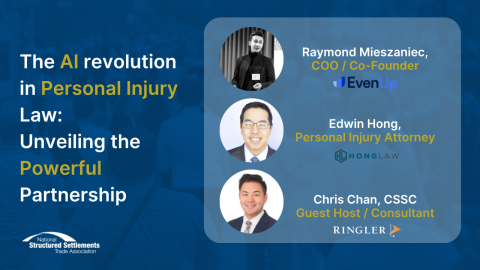
In a recent podcast conversation, Edwin, an attorney at Hong Law and managing attorney at Simon Law Group, and Raymond, the COO and co-founder of EvenUp, delved into the fascinating intersection of artificial intelligence and personal injury law. They explored the potential of AI to revolutionize the legal landscape while highlighting its current applications and ethical considerations. Here are the key takeaways from their discussion:
Introduction to the Experts:
Edwin, a seasoned attorney, shared his passion for incorporating AI into his everyday practice. Meanwhile, Raymond, the driving force behind EvenUp, shared the inspiring journey that led him to create an AI-powered platform to level the playing field in personal injury cases.
EvenUp's Mission and AI Integration:
Raymond's personal experience with a tragic accident in his family motivated him to establish EvenUp. The mission of EvenUp is to enhance transparency in personal injury law and provide plaintiff attorneys with the data and insights needed to maximize their client's claims. Through AI-powered demand packages, EvenUp offers a comprehensive solution for attorneys, helping them present compelling cases to insurance carriers.
The Power of AI in Personal Injury Law:
Raymond explained how EvenUp's AI goes beyond traditional AI models like GPT-3. It is specifically trained on a proprietary dataset, enabling it to read and interpret medical records, extract critical information, and create detailed demand packages. By adding intricate details such as the cost of household services and future medical expenses, AI enhances the value of personal injury claims and strengthens the negotiation process.
Edwin's Perspective on AI Integration:
Edwin emphasized the importance of using AI tools to stay competitive and provide the best possible service to clients. He highlighted the advantages of AI in drafting documents, conducting research, and improving overall efficiency in the legal field. However, he cautioned that attorneys should not rely blindly on AI and must always verify its outputs.
Ethical Concerns and Human Error:
Both experts expressed concerns about the misuse of AI in the legal profession. They emphasized that attorneys should maintain their competence and not become over-dependent on AI tools. Verification of AI-generated work and safeguarding client confidentiality are essential ethical considerations.
The Future of AI in Personal Injury Law:
Raymond envisions a future where AI accelerates various aspects of personal injury law, from intake processes to settlement negotiations. AI can optimize client communication, provide real-time insights, and ensure consistent decision-making by judges. While AI will enhance efficiency and effectiveness, it will not replace the vital human elements of legal practice.
The integration of AI in personal injury law promises to revolutionize the industry. EvenUp's innovative approach and Edwin's practical insights illustrate the potential of AI to empower attorneys, increase transparency, and ultimately deliver better outcomes for clients. As the legal profession continues to evolve, AI is poised to play a pivotal role in shaping its future.
Watch the full episode of this interview below:





















